Discover the Best Help Scout Alternatives in 2025
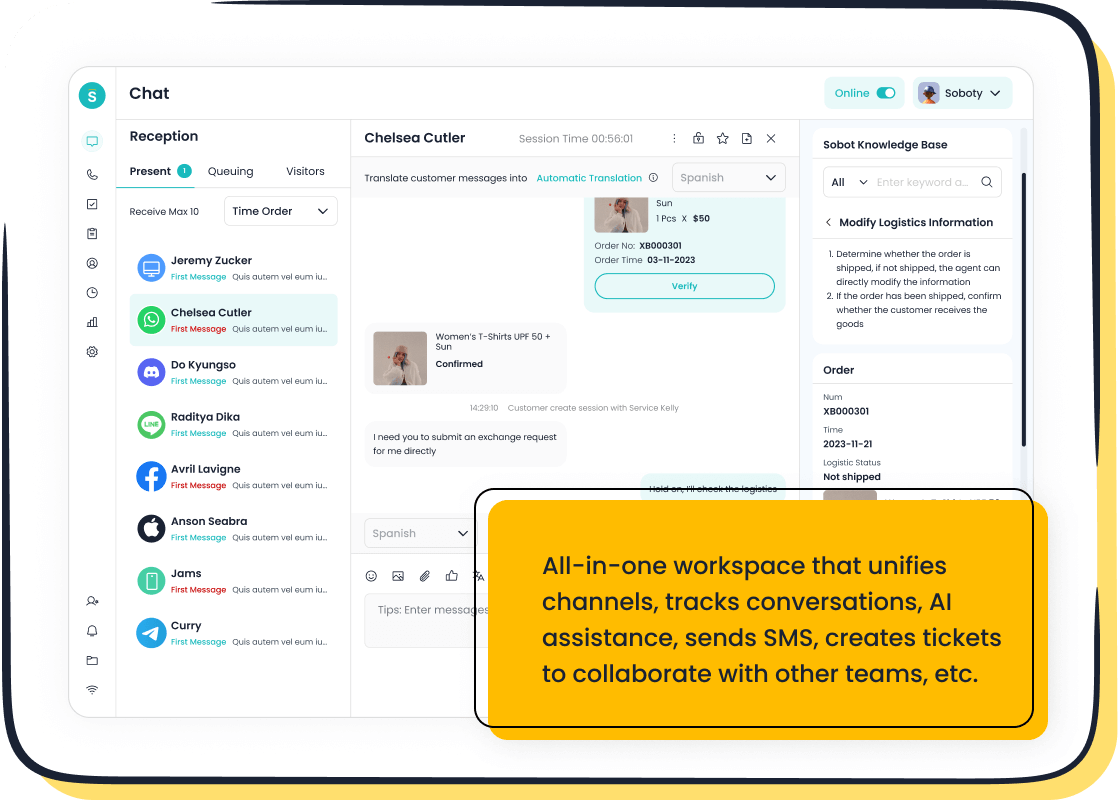
Customer expectations keep rising, don’t they? If you’re relying on Help Scout but feel it’s not quite cutting it anymore, you’re not alone. Many businesses are now exploring help scout alternatives to find tools that offer better features, scalability, or pricing.
Choosing the right customer support solution isn’t just about answering questions. It’s about creating smoother workflows, happier customers, and a more efficient team. Tools like Sobot can unify your communication channels and take your customer service game to the next level.
Top Help Scout Alternatives for 2025
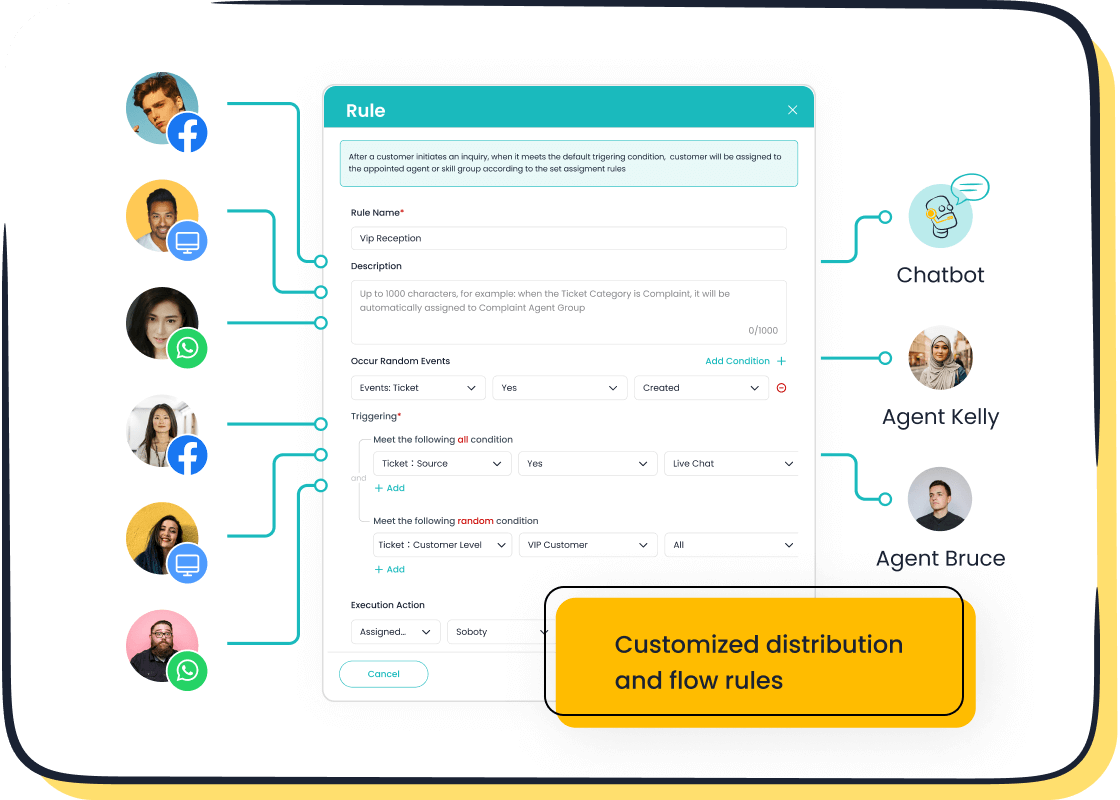
Zendesk
When it comes to customer support tools, Zendesk is a name you’ve probably heard a lot. It’s one of the most popular platforms out there, and for good reason. Zendesk offers a robust set of features that make managing customer interactions a breeze. Whether you’re handling emails, live chats, or social media messages, Zendesk keeps everything in one place.
What sets Zendesk apart is its scalability. It works just as well for small businesses as it does for large enterprises. You can customize workflows, automate repetitive tasks, and even integrate it with other tools you already use. Plus, its reporting features give you insights into your team’s performance, helping you make data-driven decisions.
If you’re looking for help scout alternatives that can grow with your business, Zendesk is a solid choice.
Freshdesk
Freshdesk is another fantastic option if you’re exploring the best help scout alternatives. It’s known for its user-friendly interface and affordability, making it a favorite among startups and small businesses.
One of Freshdesk’s standout features is its ticketing system. It organizes customer queries into tickets, so nothing falls through the cracks. You can also set up automated workflows to save time and ensure quick responses.
Freshdesk doesn’t stop at ticketing. It offers omnichannel support, allowing you to manage emails, chats, and even phone calls from a single dashboard. If you’re on a budget but still want a powerful tool, Freshdesk might be the perfect fit.
Intercom
Intercom takes a slightly different approach to customer support. It focuses on building relationships rather than just solving problems. With Intercom, you can engage customers through personalized messages, live chat, and even in-app communication.
What makes Intercom unique is its ability to adapt to your team’s needs. For instance, the platform initially aimed for 35 conversations per teammate but adjusted to 30 as responsibilities evolved. Lower response times often lead to happier customers, but Intercom balances this with conversion rates to ensure your business thrives.
Here’s a quick look at some of Intercom’s success metrics:
| Metric | Insight |
|---|---|
| Conversations per Teammate | Initially aimed for 35, now adjusted to 30 as team responsibilities have evolved. |
| Response Time | Lower response times correlate with better customer satisfaction; trade-offs may affect conversion rates. |
| Customer Satisfaction | Measuring satisfaction through simple feedback mechanisms helps anticipate churn and improve retention. |
If you’re looking for a tool that goes beyond traditional support, Intercom is worth considering.
Zoho Desk
Zoho Desk is a smart choice if you're looking for a customer support tool that simplifies your workflows. It’s designed to help you manage customer interactions efficiently while keeping your team productive. Whether you're a small business or a growing enterprise, Zoho Desk adapts to your needs.
One of its standout features is its AI assistant, Zia. Zia can analyze customer queries, suggest solutions, and even automate repetitive tasks. This means your team can focus on more complex issues, improving overall efficiency. Zoho Desk also offers omnichannel support, allowing you to handle emails, chats, and social media messages from one platform.
Here’s how Zoho Desk stacks up in customer ratings:
| Platform | Customer Rating |
|---|---|
| Zoho Desk | 4.4/5 |
| Competitor | 4.5/5 |
While its rating is slightly lower than some competitors, Zoho Desk remains a reliable option for businesses that value customization and affordability. If you're exploring the best help scout alternatives, Zoho Desk deserves a spot on your list.
Sobot Live Chat
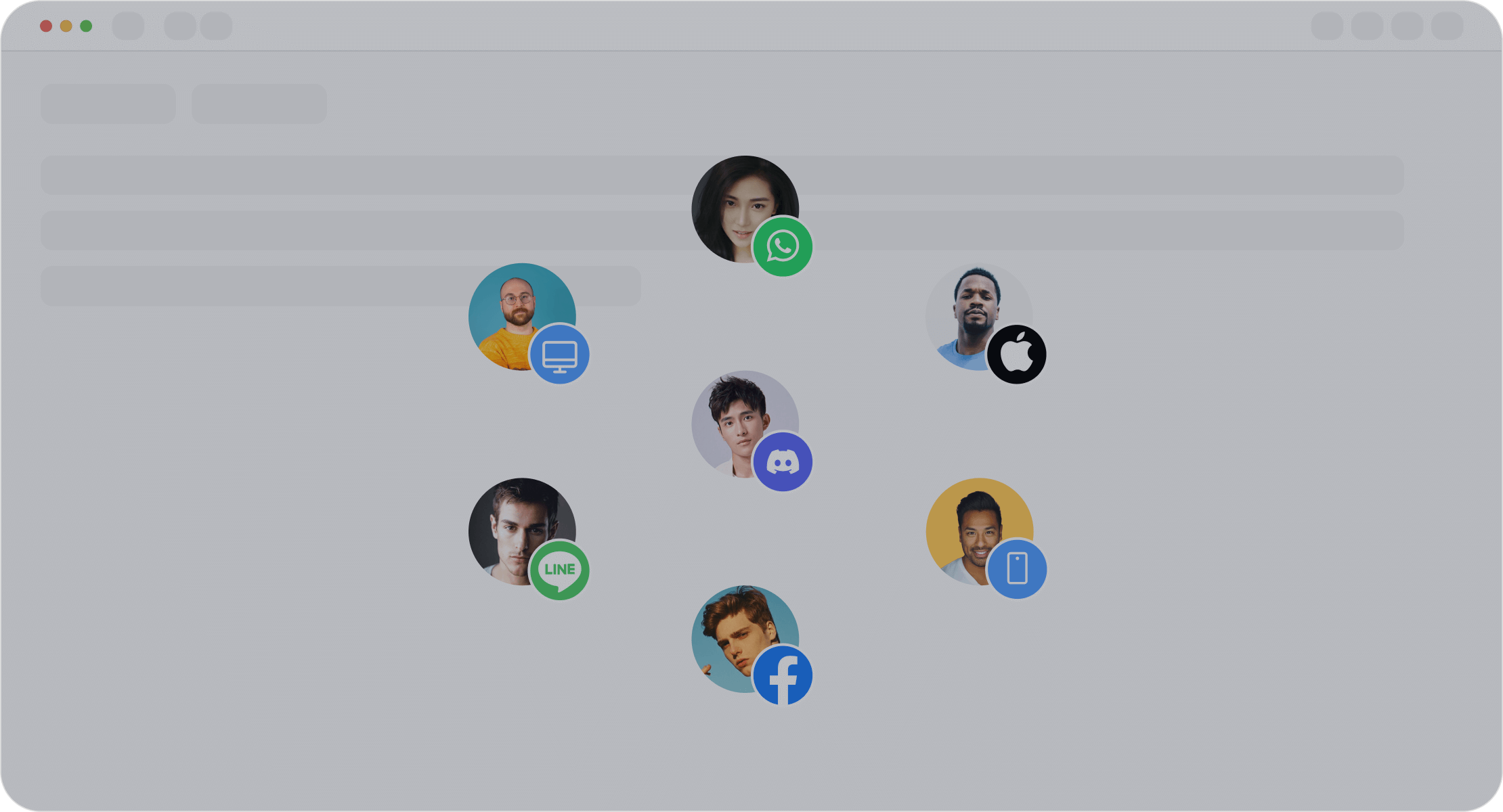
If you're aiming to elevate your customer service game, Sobot Live Chat is a tool you can't ignore. It’s more than just a chat platform—it’s a comprehensive solution for managing customer interactions across multiple channels. From websites to social media platforms like WhatsApp and Instagram, Sobot Live Chat ensures you’re always available where your customers are.
What sets Sobot apart is its efficiency and cost-effectiveness. The platform reduces inbound discussion volume by 20% and achieves a 96% positive feedback rate. Its AI-powered tools provide 80% accurate answers, helping you resolve issues faster. Here’s a quick look at its performance metrics:
| Metric | Value |
|---|---|
| Customer satisfaction rate | 95% |
| Self-service question resolution | 22.2% |
| Problem resolution rate | 85% |
| Customer happiness rate | 99% |
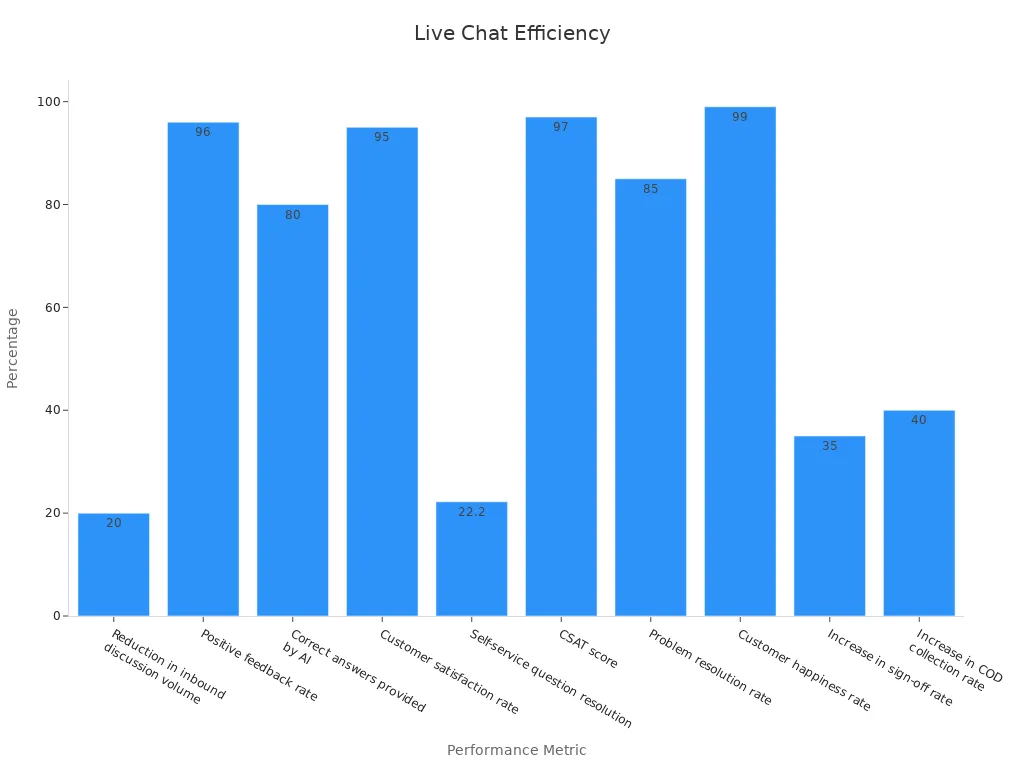
Sobot Live Chat also boosts conversions by 38%, thanks to its precise profiling and tailored services. It’s a perfect fit for businesses that want to improve customer satisfaction while keeping costs low. If you're searching for help scout alternatives, Sobot Live Chat offers everything you need to succeed.
Key Features of the Best Help Scout Alternatives
Omnichannel Support for Seamless Customer Interaction
Imagine being able to connect with your customers wherever they are—whether it’s through email, social media, or real-time chat on your website. That’s the magic of omnichannel support. It brings all your communication channels into one unified workspace, making it easier for you to deliver consistent and personalized service.
Why does this matter? Because customers expect speed and convenience. In fact:
- 64% of customer service agents say having a single view of interactions improves their performance.
- 80% of consumers rank speed as the most important factor in customer service.
- 79% of organizations believe understanding the customer journey makes them more customer-centric.
Sobot’s omnichannel solution takes this a step further. It integrates platforms like WhatsApp, Instagram, and Telegram into one seamless system. You can respond faster, reduce missed messages, and keep your customers happy. If you’re looking for a customer communication platform that simplifies interactions, this feature is a game-changer.
AI and Automation for Enhanced Efficiency
Let’s face it—handling repetitive queries can drain your team’s energy. That’s where AI and automation come in. These tools streamline your workflows, letting you focus on complex issues while routine tasks are handled automatically.
Here’s how AI boosts efficiency:
| Capability | Customer Impact | Operational Benefit |
|---|---|---|
| 24/7 Global Support | Access anytime | Simplifies staffing |
| Multi-Query Processing | Reduced wait times | Speeds up resolutions |
| Flexible Resource Management | Consistent service quality | Cuts operational costs |
Chatbots, like those offered by Sobot, can handle up to 80% of routine questions. This means faster resolutions and happier customers. Plus, with features like intelligent assignment and workflow automation, you’ll see a noticeable improvement in productivity.
Reporting and Analytics for Data-Driven Decisions
Data isn’t just numbers—it’s the key to understanding your customers and improving your operations. Robust reporting and analytics tools help you track performance, identify trends, and make smarter decisions.
Companies that use analytics extensively outperform their competitors. For example:
- Businesses using customer analytics are 23 times more likely to excel in customer acquisition.
- Advanced analytics improve operational efficiency by 15-20%.
- UPS saves 10 million gallons of fuel annually by optimizing delivery routes through analytics.
Sobot’s built-in analytics evaluate over 150 indicators, giving you actionable insights to refine your strategies. Whether it’s tracking customer satisfaction or optimizing workflows, these tools empower you to stay ahead in the competitive landscape of customer service software.
Integration with Third-Party Tools
Seamless integration with third-party tools can transform how you manage customer support. It allows you to connect your support platform with other essential systems, making your operations smoother and more efficient. Imagine syncing your customer service software with payment gateways, analytics platforms, or even CRM tools. This kind of integration enhances functionality and saves time.
Why does this matter? Because it helps you meet your customers' complex needs while staying competitive. Here’s how third-party integrations make a difference:
- They expand your platform’s capabilities, offering more value to your customers.
- They reduce manual data entry, minimizing errors and saving time.
- They enable real-time data sharing, giving you up-to-date insights for better decision-making.
- They streamline operations by automating service activation, which means faster service for your customers.
Sobot’s Live Chat, for example, integrates with platforms like Salesforce and Shopify. This ensures your team has all the tools they need in one place. You’ll spend less time switching between systems and more time focusing on what matters—your customers.
Collaboration Tools for Team Productivity
Collaboration tools are game-changers for team productivity. They help your team work together more effectively, whether they’re in the same office or spread across the globe. Tools like Slack or Microsoft Teams make communication seamless, ensuring everyone stays on the same page.
The impact of collaboration tools is undeniable. Take a look:
| Source | Evidence | Impact |
|---|---|---|
| Slack | Collaboration tools can increase remote worker productivity by 20-25%. | Enhances communication among remote teams. |
| SuperOffice | Companies prioritizing collaboration see a 10% boost in customer satisfaction. | Ensures faster response to customer needs. |
| Deloitte | 73% of employees in collaborative environments report better performance. | Drives individual and team success. |
| ElectroIQ | Collaboration tools improve productivity by 20-30%. | Boosts overall team efficiency. |
Sobot’s unified workspace takes collaboration to the next level. It consolidates customer data and team interactions in one place, making it easier for agents to share information and resolve issues quickly. When your team collaborates effectively, your customers notice the difference. Better teamwork means faster resolutions and happier customers.
Pricing Comparison of Help Scout Alternatives
Free Plans and Trials
Exploring free plans and trials is a great way to test a customer service solution before committing. Most Help Scout alternatives, including Sobot Live Chat, offer free trials to help you evaluate their features. For instance, Sobot provides a free trial that lets you experience its omnichannel capabilities and AI-powered tools without any upfront cost. This is perfect if you want to see how it fits into your workflow.
Here’s a quick comparison of free trials and entry-level pricing for Help Scout and one of its alternatives:
| Feature/Plan | Help Scout Pricing | Zendesk Pricing |
|---|---|---|
| Free Trial | Yes | Yes |
| Standard Plan | $22/user/month (limit 25) | Starting at $19 |
| Features | 2 shared inboxes, 1 Docs, AI drafts | Ticketing system, Help center, AI Agents |
Sobot’s free trial stands out because it includes access to its unified workspace and analytics tools, giving you a complete picture of its potential.
Entry-Level Pricing
When it comes to entry-level pricing plans, affordability matters. Help Scout’s Standard Plan starts at $22 per user per month, but it limits you to 25 users. In contrast, Sobot offers flexible pricing tailored to your business size, ensuring you only pay for what you need. This makes it an excellent choice for startups or small businesses looking for a cost-effective customer service solution.
Sobot’s entry-level plan includes features like omnichannel support, AI-assisted tools, and built-in analytics. These tools help you streamline your operations and improve customer satisfaction without breaking the bank.
Mid-Tier Plans
As your business grows, you’ll need a customer service solution that scales with you. Help Scout’s Plus Plan costs $44 per user per month, while its Pro Plan jumps to $65 per user per month for teams of 10 or more. These pricing plans include advanced features like custom reports and automated workflows.
Sobot’s mid-tier plans, on the other hand, offer more value for growing businesses. They include intelligent assignment, workflow automation, and integration with third-party tools like Salesforce. These features not only enhance efficiency but also help you deliver a seamless customer experience. Plus, Sobot’s pricing remains competitive, making it a smart choice for businesses aiming to scale.
Enterprise-Level Pricing
When your business reaches the enterprise level, you need a customer support solution that can handle complex operations and high volumes of interactions. Enterprise-level pricing plans are designed to offer advanced features, scalability, and tailored solutions to meet your unique needs. But how do you know if you're getting the best value for your investment? Let’s break it down.
One way to assess the value of enterprise-level plans is by looking at key metrics. These metrics help you understand how the pricing aligns with your business goals. Here’s a quick comparison:
| Metric | Description |
|---|---|
| Customer Acquisition Cost | Measures the cost of acquiring a new customer, helping assess marketing effectiveness. |
| Customer Lifetime Value | Projects the total revenue from a customer over their lifetime, indicating future profitability. |
| Churn Rate | Indicates the percentage of customers lost, useful for understanding retention issues. |
| Monthly Recurring Revenue | Reflects the monthly income from customers, aiding in pricing strategy evaluation. |
These metrics give you a clear picture of how an enterprise plan impacts your bottom line. For example, a lower churn rate and higher customer lifetime value suggest that the plan is helping you retain customers and maximize revenue.
Another important factor is value-based pricing. This approach aligns the cost of the plan with the value you experience. Here’s why it works:
- It reduces purchase anxiety by linking payment to the benefits you receive.
- It scales with your business, justifying higher prices as you derive more value.
- It minimizes risk by ensuring you only pay for what truly benefits your operations.
Sobot’s enterprise-level plans excel in these areas. They offer tailored solutions, advanced analytics, and seamless integrations to help you grow. If you’re looking for a plan that delivers both value and flexibility, Sobot has you covered.
Help Scout vs. Zendesk: A Detailed Comparison
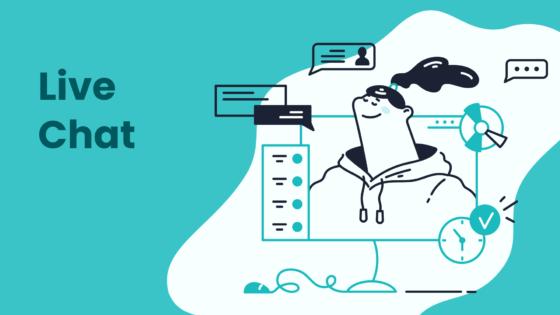
Features and Functionality
When comparing help scout vs. zendesk, the differences in features are striking. Zendesk stands out as a leader in customer support tools, offering a unified omnichannel experience, native voice solutions, and real-time agent workspaces. These features make it easier for your team to manage customer interactions efficiently. Help Scout, on the other hand, focuses on simplicity but lacks some advanced functionalities like sophisticated automation and workflows.
Here’s a quick feature comparison:
| Feature | Zendesk | Help Scout |
|---|---|---|
| Vendor performance | Leader | Visionary |
| High customer satisfaction at scale | ✓ | ✕ |
| Unified omnichannel customer experience | ✓ | ✕ |
| Native voice solution | ✓ | ✕ |
| Real-time agent workspace | ✓ | ✕ |
| Sophisticated automation + workflows | ✓ | ✕ |
| Broad apps marketplace | 1,700+ | 100+ |
Zendesk also excels in AI-powered reporting and analytics, allowing real-time monitoring of customer interactions. Help Scout lacks this capability, which can limit your ability to make data-driven decisions. If you’re looking for a tool with robust features, Zendesk is the clear winner.
Pricing and Value for Money
Pricing plays a big role in choosing between help scout vs. zendesk. Help Scout offers plans starting at $15 per user per month, making it a budget-friendly option for small teams. However, its features are limited compared to Zendesk. Zendesk’s pricing starts at $19 per agent per month for the Support Team plan, with higher tiers offering more advanced features.
Here’s a breakdown of their pricing:
| Service | Plan | Price |
|---|---|---|
| Help Scout | Basic | $15/month per user |
| Standard | $25/month per user | |
| Plus | $40/month per user | |
| Company | Contact sales | |
| Zendesk | Support Team | $19/month per agent |
| Team | $55/month per agent | |
| Growth | $89/month per agent | |
| Professional | $115/month per agent | |
| Enterprise | Contact sales |
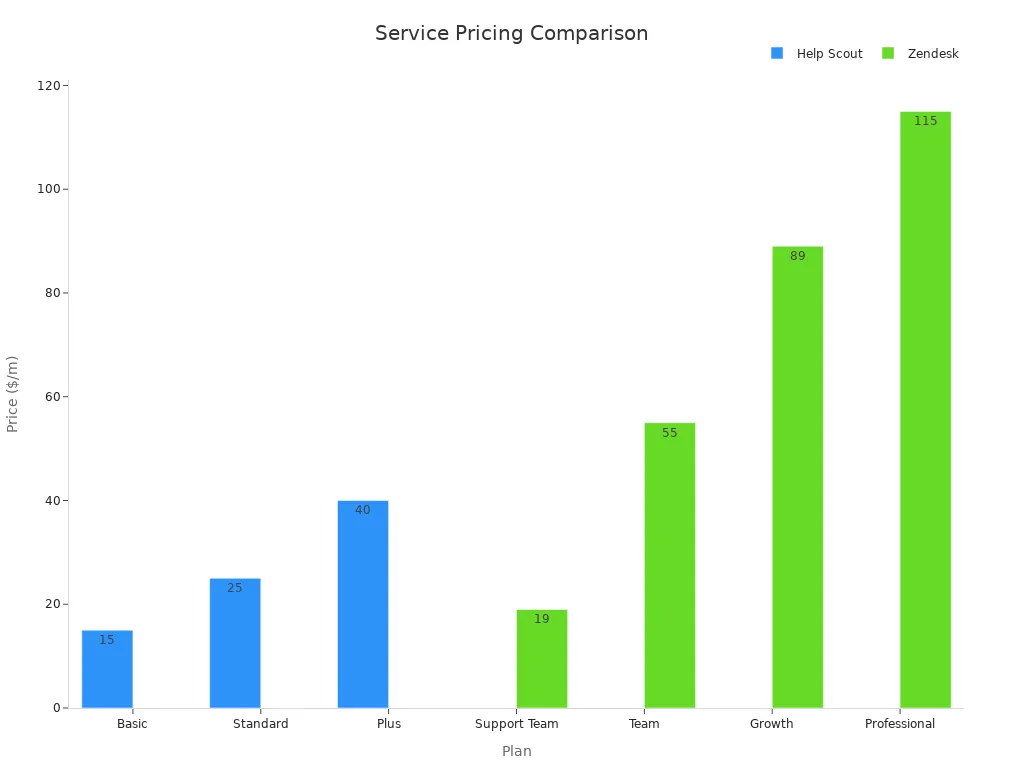
While Zendesk’s plans are pricier, they offer more value with advanced features like automation, integrations, and analytics. If you’re scaling your business, Zendesk provides better long-term value.
Customer Support and User Experience
Zendesk shines in customer support and user experience. Its real-time agent workspace and omnichannel capabilities ensure seamless communication. You can manage emails, chats, and calls from one platform, making it easier to keep your customers happy. Help Scout, while user-friendly, lacks the depth of Zendesk’s tools.
Zendesk also offers a broader app marketplace with over 1,700 integrations, compared to Help Scout’s 100+. This means you can customize Zendesk to fit your business needs better. Additionally, Zendesk’s sophisticated automation reduces manual tasks, freeing up your team to focus on complex issues.
If you value a smooth user experience and top-notch customer support, Zendesk is the better choice. Its advanced tools and integrations make it a powerful solution for businesses of all sizes.
Ideal Use Cases for Each Tool
Every business has unique needs when it comes to customer support. Choosing the right tool depends on your team size, the complexity of your operations, and the type of customer interactions you handle. Let’s break down the ideal use cases for each tool to help you decide.
Help Scout
Help Scout works best for smaller teams that prioritize simplicity. If you’re running a startup or a small business, this tool can help you manage customer queries without overwhelming your team. Its basic ticketing system and straightforward reporting make it easy to track average resolution times, which hover around 12 hours.
Here’s a quick look at where Help Scout shines:
- Teams with fewer agents who need a simple, user-friendly interface.
- Businesses that don’t require advanced analytics or automation.
- Companies looking for affordable solutions with basic self-service options.
Zendesk
Zendesk is a powerhouse for larger teams and businesses with complex products. It’s designed to handle high volumes of customer interactions across multiple channels. If you need advanced analytics, extensive reporting, or a comprehensive ticketing system, Zendesk is your go-to.
| Metric | Help Scout | Zendesk |
|---|---|---|
| Average Resolution Time | 12 hours (with variability) | Not specified |
| Ticket Resolution Insights | Pie chart reporting available | Extensive analytics features |
| User Base | Smaller teams | Larger teams and complex products |
Zendesk also excels in providing insights into customer satisfaction. It helps you identify areas for improvement, making it ideal for businesses aiming to refine their customer service strategies.
Here’s why Zendesk might be the perfect fit for you:
- You manage a large team or serve a diverse customer base.
- Your business requires detailed analytics to track performance and customer satisfaction.
- You need a robust self-service option to empower customers to find answers on their own.
Freshdesk
Freshdesk is a great choice for startups and small businesses on a budget. Its ticketing system ensures no query gets overlooked, while its omnichannel support keeps all your communication in one place. If affordability and ease of use are your top priorities, Freshdesk won’t disappoint.
Intercom
Intercom focuses on building relationships rather than just solving problems. It’s perfect for businesses that want to engage customers through personalized messages and in-app communication. If you’re in SaaS or e-commerce, Intercom can help you boost customer retention and satisfaction.
Sobot Live Chat
Sobot Live Chat is ideal for businesses that want to enhance customer engagement across multiple channels. Its omnichannel capabilities and AI-powered tools make it a standout choice for improving efficiency and customer satisfaction. If you’re looking to boost conversions and streamline operations, Sobot Live Chat is a must-have.
How to Choose the Best Help Scout Alternative for Your Business
Assessing Your Business Needs
Choosing the right customer support tool starts with understanding your business needs. Every business is unique, so you need to identify what matters most to you. Are you looking for a tool that’s easy to use? Or do you need advanced features like automation and analytics?
Here’s a quick breakdown of essential criteria to consider:
| Criteria | Description |
|---|---|
| Ease of Use | The software should be user-friendly to ensure quick adoption by the team. |
| Integration Capabilities | Must integrate seamlessly with existing systems like CRMs and billing tools. |
| Scalability | The solution should grow with the business needs over time. |
| Vendor Reliability | The vendor should have a proven track record of providing reliable updates and support. |
| Collaboration Features | Tools should facilitate teamwork, including features like ticket assignments and private notes. |
| Reporting and Metrics | Essential for tracking performance metrics and team efficiency. |
| Automation Features | Should automate repetitive tasks to improve efficiency and response times. |
Think about your current challenges. For example, if your team struggles with repetitive tasks, automation should be a priority. If you’re managing multiple communication channels, omnichannel support is a must.
Evaluating Scalability and Growth Potential
Your business won’t stay the same forever, so your support tool shouldn’t either. Scalability is key. You need a solution that can handle your growth without breaking a sweat.
Take inspiration from companies like Netflix and Amazon. They use scalable solutions like cloud infrastructure and microservices to handle millions of users. This ensures uninterrupted service even during peak times.
To evaluate scalability, follow these steps:
- Assess your current systems and future growth projections.
- Identify potential bottlenecks in your operations.
- Set clear objectives and KPIs that align with your business goals.
- Involve stakeholders from different departments for a well-rounded perspective.
- Choose technologies that support scalability, like AI and automation.
- Regularly review your strategy and adjust based on performance data.
A scalable tool ensures you’re ready for whatever comes next, whether it’s a surge in customer inquiries or expanding to new markets.
Considering Ease of Use and Onboarding
Ease of use can make or break your experience with a new tool. A user-friendly platform ensures your team adopts it quickly, saving time and reducing frustration.
Metrics like Customer Effort Score (CES) and Onboarding Completion Rate (OCR) can help you gauge ease of use. For example:
| Metric | Description | Example Calculation |
|---|---|---|
| Customer Effort Score (CES) | Measures ease of onboarding experience. Lower scores indicate easier onboarding. | CES = Total Score / Number of Customers |
| Onboarding Completion Rate (OCR) | Percentage of users who complete the onboarding process. Higher rates indicate better onboarding success. | OCR = (Completed Onboarding / Total Onboarded) * 100 |
| User Support Request Rate (USRR) | Indicates how many users needed support during onboarding. Higher rates suggest difficulties. | USRR = (Support Requests / Total Onboarded) * 100 |
Look for tools with intuitive interfaces and strong onboarding support. Platforms like Sobot Live Chat offer free trials, so you can test the waters before committing. A smooth onboarding process ensures your team hits the ground running, making the transition seamless.
Importance of Customer Support and Training
When you’re adopting a new customer support tool, having strong support and training can make all the difference. It’s not just about learning how to use the software—it’s about feeling confident that you’re getting the most out of it. That’s why the best tools don’t just stop at selling you a product. They guide you every step of the way.
Think about onboarding. Personalized onboarding sessions and one-on-one training help you and your team hit the ground running. You get to learn the ins and outs of the tool in a way that fits your specific needs. This kind of tailored support ensures you’re not left scratching your head when challenges arise.
But it doesn’t stop there. Continuous learning opportunities, like webinars and advanced courses, keep you exploring new features. These resources help you unlock the full potential of the tool over time. After all, education isn’t just for the beginning—it’s a journey that keeps you ahead of the curve.
Here’s why this matters:
- Direct support during the adoption phase ensures you’re using the tool to its fullest.
- Ongoing training boosts retention rates and encourages account growth.
- Feeling supported makes you more likely to stick with the tool and renew your contract.
When you feel equipped and supported, you’re not just using a tool—you’re building a partnership. That’s what makes customer support and training so essential. It’s not just about solving problems; it’s about empowering you to succeed.
Choosing the right customer support tool can transform your business. The top Help Scout alternatives, like Zendesk, Freshdesk, and Sobot Live Chat, offer standout features such as omnichannel support, AI-driven automation, and robust analytics. Each tool caters to different needs, whether you're a small startup or a growing enterprise.
Here’s a quick comparison to help you decide:
| Alternative | Best for | Free Trial | Pricing | Ratings |
|---|---|---|---|---|
| ThriveDesk | SaaS, eCommerce, healthcare & SMB | Yes | $9/month | 4.7 |
| Freshdesk | Enterprise-level organizations | Yes | $15/month | 4.6 |
| HubSpot | Customer-based industries | Yes | $45/month | 4.4 |
| LiveAgent | Small and Mid-sized businesses | Yes | $9/month | N/A |
| Jira Service Management | Medium to large businesses | Yes | $17.65/month | 4.5 |
| Zendesk | All sizes businesses | Yes | €69/month | 4.4 |
| Groove | Small business | Yes | $15/month | 4.5 |
| TeamSupport | Medium to large B2B organizations | Yes | $29/month | 4.6 |
| Crisp | Low-mid market | Yes | $25/month | 4.5 |
| Zoho Desk | Small businesses or startups | Yes | $7/month | 4.5 |
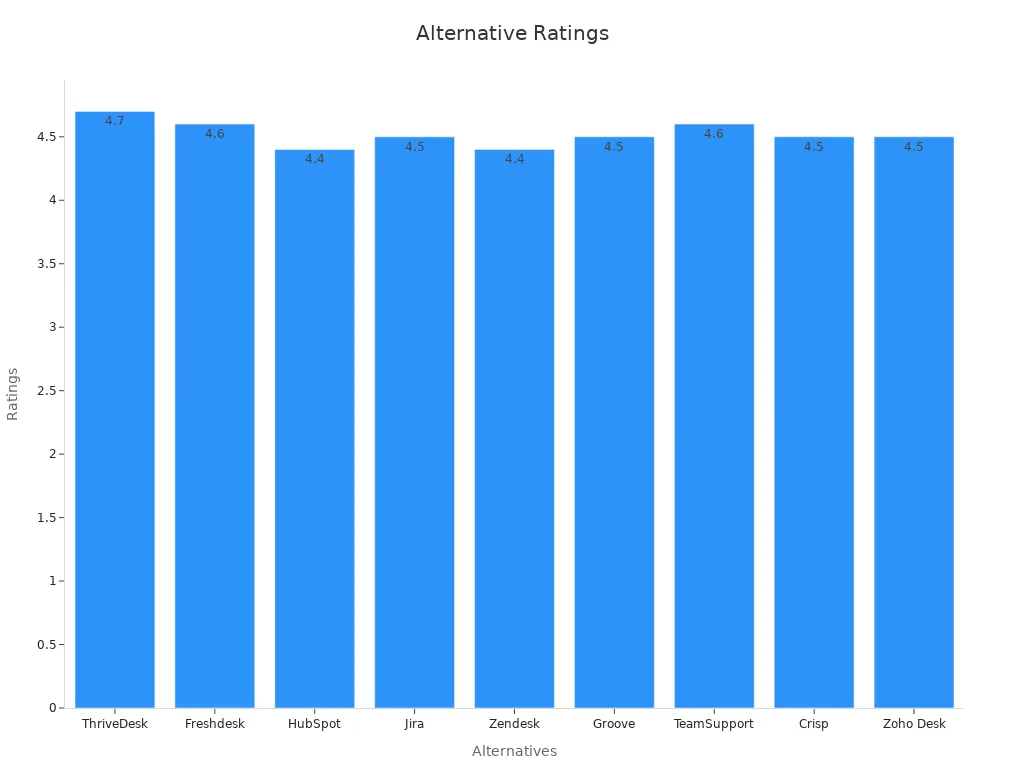
The key is to align the tool with your business needs. Think about your team size, customer base, and growth plans. Most of these platforms, including Sobot Live Chat, offer free trials. Take advantage of them to explore features and find the perfect fit for your operations.
Remember, the right tool doesn’t just solve problems—it helps you build stronger customer relationships.
FAQ
What is the best Help Scout alternative for small businesses?
If you're running a small business, tools like Freshdesk or Sobot Live Chat are excellent choices. Freshdesk offers affordability and simplicity, while Sobot Live Chat provides omnichannel support and AI-powered tools to boost efficiency. Both options help you deliver great customer service without breaking the bank.
Can I try these Help Scout alternatives for free?
Yes! Most alternatives, including Sobot Live Chat, Zendesk, and Freshdesk, offer free trials. These trials let you explore features like omnichannel support, automation, and analytics before committing. It’s a great way to see which tool fits your needs best.
How does Sobot Live Chat improve customer satisfaction?
Sobot Live Chat enhances customer satisfaction by offering omnichannel support, AI-powered tools, and fast response times. It keeps all conversations in one place, so you never miss a message. Plus, its analytics help you optimize your service, ensuring happier customers and better results.
Are these tools easy to integrate with other systems?
Absolutely! Many Help Scout alternatives, like Sobot Live Chat and Zendesk, integrate seamlessly with platforms like Salesforce, Shopify, and CRMs. This makes it easier to streamline your operations and keep all your tools connected for a smoother workflow.
How do I choose the right Help Scout alternative for my business?
Start by identifying your needs. Do you need omnichannel support, automation, or advanced analytics? Consider your team size and budget. Then, test free trials to see which tool feels right. Sobot Live Chat, for example, offers a free trial to help you decide.
See Also
How to Select the Ideal Chat Software for 2024
Best 10 Speech Analytics Solutions for Call Centers 2024
Comparing Leading Live Chat Solutions for 2024